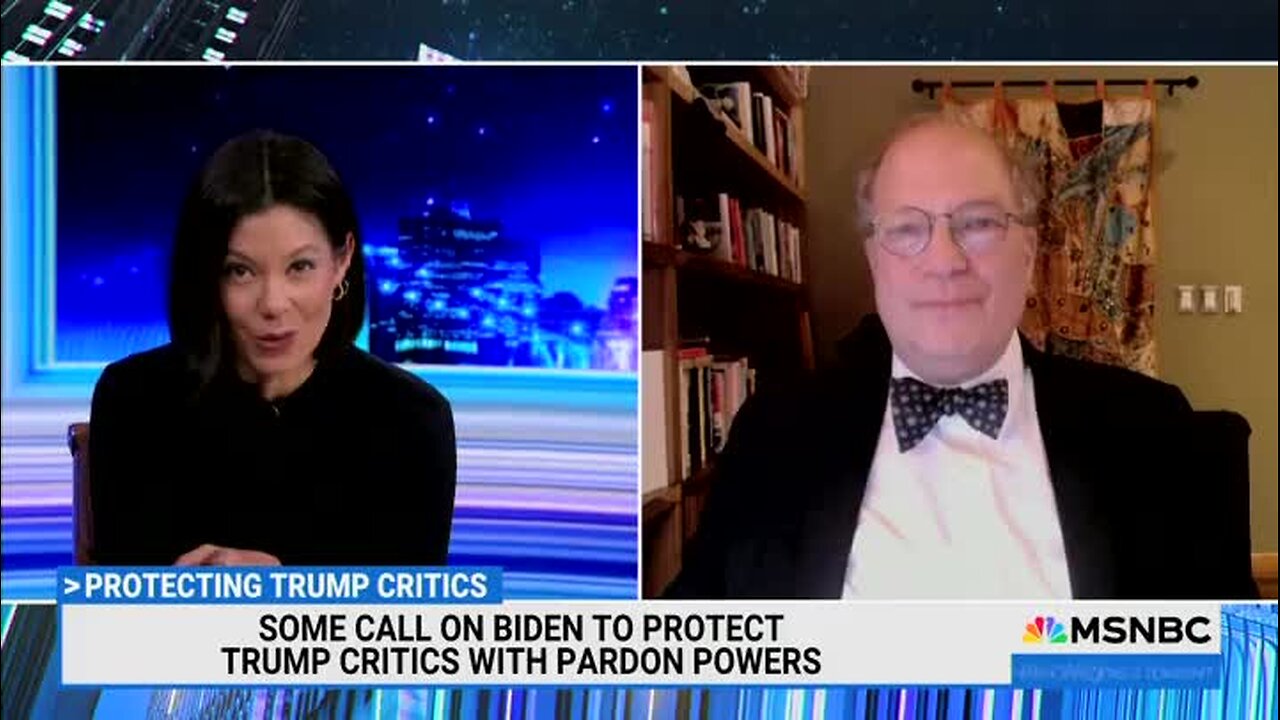Premium Only Content

Paul Rosenzweig: ‘Perfectly Reasonable’ for Biden to Pardon Trump Critics
WAGNER: “I’m eager to hear about your own sort of personal evolution on this, because I know in 2017 you argued, ‘We defend norms by defending norms, not preaching them.’ A lot has happened between now and then, and I wonder how you’re thinking about the president’s pardon power today and how he should wield it.”
ROSENZWEIG: “Well, back in 2017, I thought that Trump was an aberration, an unusual and black swan, if you will. And my thought was that you had to defend the norms of the rule of law, good governance, and the only way to do that was to maintain them even in the face of his aberrational behavior. Today I think we know that Trump is not an aberration. He’s a phenomenon. He’s a movement. And as such, what we have to do is re-calibrate how we respond to that. And it now strikes me as essential to at least begin to play to the edge of the field, right, to go as far as the law permits in combating the authoritarian excesses of Trump. And the way I wrote about it in The Atlantic is the pardon power. A pardon for Hunter Biden, a pardon for Trump’s critics would be completely normative-breaking and it would be out of character, out of historical tradition. But at this point, I was listening to your earlier broadcast, you were talking about Kash Patel. He’s got a list of 60 people he wants to prosecute. That’s a real list. Will he do all of them? I don’t know. Will there be resistance at the FBI? Probably. But one of the realities of being investigated is that investigation has a cost, even if you’re not prosecuted in the end. You have to hire a lawyer, the mental cost, the time, the resources. So it strikes me as perfectly reasonable to ask what can President Biden do within the bounds of law, even if it would not be normatively traditional to save his allies from that. And the answer is, obviously, pardon them.”
WAGNER: “Yeah. It seems to you, and I think two other folks as well, that the argument about institutional preservation in this moment is best relegated to academics, and that in reality it’s time to play political hardball. And it sounds like you’re extending that not just with the pardon power, but to other levers the Democrats might be able to pull. I’ll read an excerpt from your Atlantic piece. ‘It has become painfully self-evident that democratic self-restraint is a form of unilateral disarmament that neither persuades Trump to refrain from bad behavior nor wins points among the undecided. It is time, well past time, for responsible Democrats to use every tool in their toolkit.’ Does any part of that, I guess, worry you? You know, one could have said the Democrats, when they were in control of the Senate, should’ve gotten rid of the filibuster and done stuff. Well, now it seems like the filibuster is the only thing that’s actually going to stop Trump from enacting probably the broadest, most pernicious parts of his agenda. So how do you think about the cost-benefit analysis here?”
ROSENZWEIG: “Well, of course it worries me. It has to. It has to worry any sensible thinking person, to argue for breaching norms that have guided our country for 250 years. On the other hand, I don’t think the Democratic self-restraint is what is going to stop Trump from acting. If, in the end, Trump and the Republican majority think that the filibuster is a barrier to whatever it is that they want, for example, they’re going to get rid of it anyway, whether or not the Democrats have done so in the prior Congress. And so, it strikes me as essential to begin trying to take steps that can’t be reversed, or irreversible steps in defense of, say, voting rights for example, expanding the franchise, guaranteeing federally against state interference. You know, we would still have to contend, obviously, with the Supreme Court, but for two years the Democrats had a majority in both houses and instead of doing transgressive, normative things like changing the electoral rules to prevent Trump’s cheating, they did normal Democratic things, they passed the Inflation Reduction Act and the Bipartisan Infrastructure Act. All good things, I’m sure, from their perspective, but they thought that that would be how to reclaim America. And it turned out they were wrong.”
WAGNER: “Well, it is a deeply thought-provoking position you have taken and written about, very articulately. It’s great to have you on the show, Paul Rosenzweig. Thanks again for your time tonight.”
-
 1:19
1:19
Grabien
4 hours agoSchumer: ‘We Didn’t’ Mislead the American Public About Biden’s Cognitive Decline
26 -
 LIVE
LIVE
Vigilant News Network
8 hours agoEXPOSED: Secret Government Plot to Deploy Aerosolized ‘Vaccines’ Using Drones | Media Blackout
1,978 watching -
 1:13:49
1:13:49
Josh Pate's College Football Show
5 hours ago $0.30 earnedSemifinal Predictions: OhioSt v Texas | Notre Dame v PennSt | Playoff Cinderella | Alabama’s Future
7.69K1 -
 27:56
27:56
The Why Files
1 day agoThe Seventh Experiment: Lacerta Reveals the Truth of our Creation
76.4K55 -
 45:53
45:53
hickok45
15 hours agoSunday Shoot-a-Round # 262
14.3K15 -
 4:52:32
4:52:32
Rotella Games
22 hours agoGrand Theft America - GTA IV | Day 1
61.3K6 -
 8:16:19
8:16:19
Joe Donuts Gaming
16 hours ago🟢Fortnite Live : Chill Vibes Lounge!
81.4K5 -
 38:43
38:43
Standpoint with Gabe Groisman
11 hours agoEp. 63. Terror Strikes the Nova Music Festival. Ofir Amir
149K49 -
 36:04
36:04
Forrest Galante
21 hours agoPrivate Tour of an Indian Billionaire’s Secret Wildlife Rescue Center
117K18 -
 9:37
9:37
Space Ice
1 day agoMorbius Is The Perfect Movie, Everyone Just Lied To You - Best Movie Ever
103K30